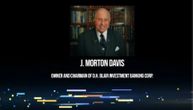Ranka is first mayor of Serb origin in Australia: She tells Telegraf about work, problems Serbs face
After taking the oath of office as one of 11 councilors in the Brimbank Council, Ranka Rasic was elected mayor of this municipality of Melbourne, which is home to about 210,000 people.
The real face of a country is represented in the world by its people who, for various reasons, live abroad. Some have found their place under the sun in distant lands, but even then they are not forgetting their origins or Serb roots. Many are in prominent and important positions, making important decisions on behalf of a large number of people. Among them is our interlocutor Ranka Rasic, the first mayor of Serb origin in an Australian city.
Ranka Rasic was elected mayor of the municipality of Brimbank, which is located in the northwest of Melbourne. The municipality has about 210,000 inhabitants, and the honor of leading was given to this Serb woman in the election last year.
In an interview with Telegraf.rs from the faraway Australia, Mayor Ranka Rasic talks about what motivated her to enter in politics and how the locals reacted to the fact that their municipality is headed by a woman with Serb roots.
- You're the mayor of the Brimbank municipality. That's a very responsible job, please describe what your day at work looks like?
My days are completely different now during Covid, compared when we weren't in lockdown. A typical day includes online meetings with City Council members, various organizations, and sometimes members of the community. I often deal with the local population and the issues that concern them and how we as a city we can improve their lives in Brimbank.
When we are not in lockdown, I can visit different places, groups in the community and really experience it.
- What inspired you to go into politics?
My passion for the community inspired me to run in the elections. After talking to the locals about what was important to them and about their frustrations over the lack of action in our local area, I decided to raise my hand and contribute to creating a better Brimbank for everyone.
- How long will you serve as mayor and what are your future plans regarding politics?
As one of the 11 councilors who represent the Brimbank Council, I took the oath of office for a four-year term on November 10, 2020. I was one of seven councilors elected for the first time while four were reelected. After that, on November 17, I was elected mayor for a 12-month term.
- What are your priorities?
As mayor, I work with my fellow councilors to improve Brimbank's reputation as a vibrant and inclusive community and to continue the special legacy of inclusion that Brimbank represents. My focus is on the important tasks of improving and enhancing Brimbank in order to ensure the best possible quality of life for the community, providing support and advocacy for Brimbank through the Covid crisis recovery process.
During my tenure as a councilor, I work to address key issues facing our community, including the need for better local roads, improved community services, even better parks for residents, creating a more sustainable and greener city, and ensuring Brimbank gets a fair share of funding.
- How hard is it to achieve all that?
Advocating for Brimbank at other levels of government is also essential. Earlier this year, with some of my fellow councilors, I attended the National General Assembly of the Australian Association of Local Governments in Canberra, in order to advocate for Brimbank at the national level. I was delighted to receive unanimous support of the Assembly on key issues such as climate change, the expansion of JobKeeper and JobSeeker, investment in social and affordable housing, and partnerships for jobs and skills for local governments.
I also had the opportunity to advocate for important priorities during meetings in Parliament.
During the past year, Brimbank has successfully advocated for more than $160 million in state and federal investment for our community, and we will continue to do so.
- You are the first woman of Serb origins holding such office in Australia. How did the local population react when you became mayor, considering you are a woman and a Serb?
I received a wonderful reaction from the Serb community in Brimbank and our compatriots across Australia. In Brimbank, 58 percent of the population speaks a language other than English and almost half were born abroad - my heritage is not rare or unusual and this diversity is something I love about Brimbank.
Whenever I walk in the local streets shopping for groceries, going to lunch or a meeting, I can almost always hear my mother tongue along with dozens of other languages that contribute to the diversity of this place.
Brimbank residents are used to community leaders coming from different backgrounds - because it reflects their community and I think it helps us represent them better. This shared life experience helps us better understand what they need, to help them enjoy a better quality of life, their priorities and what is important to them.
- Tell us something about your Serb origins. Where were you born, are you married and do you have children?
I was born in Livno, Bosnia and Herzegovina, and spent my teenage years in Sombor (Serbia). After the break-up of Yugoslavia in the 1990s, I came to Melbourne with my family, and Brimbank was my first Australian home, where I still live with my husband and two children.
- How long did it take for Australia to become your second home?
Multiculturalism and a mixture of different nationalities, traditions and cultures made me feel at home in Brimbank. I soon fell in love with this bustling city, in which I created lifelong connections through work and community. Before becoming the mayor, I devoted most of my time to my small business and raising my children. I have always been passionate about communities. I have been involved in a number of local community engagements, including advocating for improving local roads. I ran a successful campaign to set up road safety barriers, which reached all the way to the Victoria Parliament.
- When were you in Serbia last? Do you plan on coming here again soon?
The last time I was in Serbia was in 2019. It was nice to see family and friends. I plan to go there again as soon as travel restrictions are eased and we are able to travel safely.
- Is there a Serb community in Brimbank? Do you know how many Serbs live there?
Yes, our Serb community is very active, we have three local Serb senior groups. The last census in Australia in 2016 showed there were 2,548 people of Serb descent living in Brimbank (meaning they were born in Serbia or their parents or grandparents were born there).
This is 1.3 percent of the total population of Brimbank, which is twice as much compared to the bigger Melbourne. To clarify, Brimbank is a municipality in Melbourne, with a population of about 210,000 people. About five million people live in Melbourne.
- What are the main problems faced by Serbs in Brimbank and in Australia generally speaking?
Recognition of completed education in Serbia is a big problem for our Serb community in Australia. Many Serbs spend years gaining qualifications in Serbia just to come here, and so muchof it is not recognized.
- The Covid pandemic shook the world last year, and it isn't over yet. What's the situation with coronavirus in your city, are you also in lockdown like many other places in Australia?
Compared to many other countries around the world, Australia was lucky in overcoming the effects of Covid-19. Here in Melbourne, we were hit much harder than the rest of Australia, including a significant economic impact of the lockdowns in Melbourne.
Melbourne is currently in the sixth lockdown. We recently reached the 200th day in lockdown since the pandemic entered our community in March 2020.
- What is life currently like in the city?
Across Melbourne, people are only allowed to leave their homes for certain reasons, children are studying from home, we have travel restrictions, curfews and, unfortunately, local restaurants, cafes and shops have been hard-hit.
Unfortunately, this impact was even more serious in Brimbank. We have higher unemployment rate compared to the rest of our country and a greater economic slowdown compared to other areas.
Part of that is due to the demographics of our area. Many in our community are already vulnerable, with limited savings to protect them from economic shocks, who rely on occasional work without sick leave, and many are working jobs that cannot be done from home.
- Do you see a way out of that difficult situation?
A high priority for the Brimbank Council is to provide support to the community to recover from the effects of coronavirus.
However, I am optimistic that we have a bright future. A number of exciting infrastructure projects are taking place in our area - including the construction of a new health and wellness center - which will include a water center.
This project alone will create about 100 jobs during construction and another 120 jobs when it becomes operational - providing a range of preventive health services, well-being, social, educational and support services, programs and initiatives.
(Telegraf.rs)

